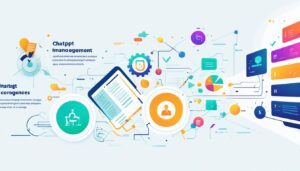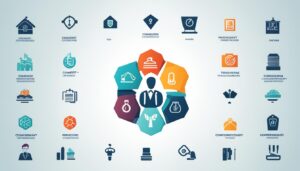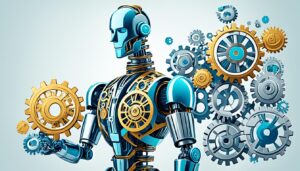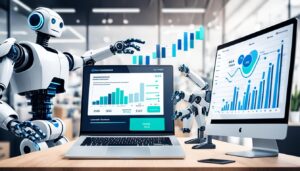Did you know that the global AI software platforms market is projected to reach $28.4 billion by 2024? Artificial intelligence tools have become indispensable for businesses across various industries, revolutionizing the way they operate and innovate. In this article, I will delve into the top artificial intelligence tools that are expected to dominate the market in 2024.
These cutting-edge AI software platforms offer a wide range of features and capabilities, empowering businesses to streamline their operations, drive efficiency, and stay ahead of the competition.
From project management to content creation, HR, and beyond, the best AI tools for businesses in 2024 will transform industries and unleash unprecedented productivity. Let’s explore these game-changing tools and discover how they can elevate your business to new heights of success.
What Are AI Tools and How Do They Work?
AI tools, short for artificial intelligence tools, are software applications that utilize machine learning technology to perform a wide range of tasks based on specific criteria provided by the user. These tools are designed to enhance productivity and automate repetitive tasks, saving businesses valuable time and resources.
AI tools leverage algorithms and data analysis to generate accurate and efficient results across various industries and purposes, including content writing, design, video creation, and project management.
With their advanced capabilities, AI tools can analyze large datasets, identify patterns, and make data-driven decisions. They can process natural language, image recognition, and even voice commands to provide users with personalized experiences. By harnessing the power of artificial intelligence, businesses can streamline operations, improve efficiency, and drive innovation.
Machine Learning Algorithms
AI tools utilize machine learning algorithms to process and analyze data. These algorithms allow the software to learn from patterns and make predictions or decisions without explicit programming.
Through a process called training, AI algorithms are trained using large datasets to identify patterns and establish relationships between input data and desired outputs. The more training data an AI tool receives, the more accurate and effective it becomes in generating results.
Data Analysis and Pattern Recognition
AI tools excel at data analysis and pattern recognition. They can quickly analyze vast amounts of data, extract meaningful insights, and identify patterns that human operators might miss.
This capability is especially useful for businesses that deal with large volumes of data, such as customer information, market trends, and operational metrics. AI tools can help businesses identify valuable trends, optimize processes, and make informed decisions.
Automation and Efficiency
One of the main benefits of AI tools is their ability to automate repetitive tasks and improve overall efficiency. By leveraging machine learning algorithms, these tools can perform tasks that traditionally require human intervention, such as data entry, image tagging, or content generation.
This automation frees up human resources, allowing them to focus on more complex and creative tasks, while AI tools handle the routine and time-consuming activities.
Furthermore, AI tools can adapt and learn from feedback and user interactions, continually improving their performance over time. They can fine-tune their algorithms based on user preferences and deliver more personalized results. Through continuous learning and adaptation, AI tools evolve to provide more accurate and valuable outcomes.
Overall, AI tools and technologies offer businesses a powerful set of software solutions that leverage machine learning and data analysis to streamline processes, automate tasks, and unlock new opportunities for innovation. From enhancing productivity to driving efficiency, these tools have the potential to revolutionize the way businesses operate in the digital age.
Benefits of Using AI Productivity Tools
Using AI productivity tools in business operations offers numerous advantages. These tools can automate workflows, boosting efficiency and accuracy in completing tasks. With advanced AI applications on the rise, businesses can reap the benefits of real-time customer data analysis, creative content generation, and market trend prediction.
AI tools also foster seamless communication within teams, enhancing overall workflow efficiency. In 2024, the top AI technology trends are expected to include advanced AI applications across various industries, such as healthcare, finance, and manufacturing.
| Benefits of AI Productivity Tools | |
|---|---|
| Automation of workflows | Tasks are completed quickly and accurately. |
| Real-time customer data analysis | Insights to drive personalized customer experiences. |
| Market trend prediction | Stay ahead of competitors with informed business strategies. |
| Creative content generation | Efficiently produce engaging and tailored content. |
| Improved workflow efficiency | Streamline communication and collaboration within teams. |
| Advanced AI applications | Benefit from cutting-edge AI technology trends across industries. |
Top AI Tools for Project Management
In the fast-paced world of project management, staying ahead requires efficient collaboration, effective task management, and real-time progress tracking. This is where AI tools come into play. By leveraging the power of artificial intelligence, businesses can enhance their project management processes and improve overall productivity.
One of the top AI tools for project management in 2024 is Nifty. With its intelligent resource allocation feature, Nifty ensures that the right resources are allocated to the right tasks, optimizing efficiency and minimizing bottlenecks.
Additionally, Nifty offers automated issue resolution, enabling teams to identify and resolve project roadblocks quickly. Its intuitive task management capabilities allow for seamless coordination and enable teams to meet important milestones.
Another popular AI tool for project management is ClickUp. With its comprehensive suite of features, ClickUp empowers teams to collaborate effectively and streamline their workflow. From task assignments to time tracking, ClickUp provides a centralized platform for project management. It also offers real-time progress tracking, allowing teams to have a clear view of the project’s status and make informed decisions.
Monday is another AI tool that deserves mention in the realm of project management. With its user-friendly interface and robust functionalities, Monday enables teams to manage projects, tasks, and deadlines with ease. It offers intuitive visual boards, automated notifications, and customizable workflows, making it an ideal tool for agile project management.
The Benefits of AI Tools for Project Management
AI tools for project management provide several key benefits:
- Efficient Resource Allocation: AI tools analyze project requirements and assign resources effectively, ensuring optimal allocation.
- Automated Issue Resolution: By leveraging AI algorithms, these tools identify and resolve project issues promptly, preventing delays and disruptions.
- Streamlined Task Management: AI tools offer intuitive interfaces for task assignment, progress tracking, and deadline management, simplifying the project management process.

“AI tools revolutionize project management by enhancing collaboration, automating tasks, and providing valuable insights for informed decision-making.”
| AI Tool | Key Features |
|---|---|
| Nifty | Intelligent resource allocation, automated issue resolution, and task management |
| ClickUp | Comprehensive project management suite, real-time progress tracking, and centralized collaboration |
| Monday | User-friendly interface, visual boards, automated notifications, and customizable workflows |
By utilizing these AI tools, businesses can simplify complex project management processes, increase team efficiency, and ensure successful project delivery. With real-time insights at their fingertips, project managers are equipped to make data-driven decisions, improve resource utilization, and drive project success.
Top AI Writing Tools for Content Creation
AI writing tools have revolutionized the way businesses create content. With their powerful artificial intelligence algorithms, these tools can generate high-quality content quickly and efficiently. Whether you need to write engaging blog articles, captivating social media posts, or persuasive ad copy, AI writing tools can be a game-changer for your content marketing strategy.
One of the top AI writing tools for content creation is Chat-GPT. Powered by OpenAI’s GPT-3 technology, Chat-GPT can produce human-like text that seamlessly integrates with your brand voice.
It offers advanced capabilities such as creative content generation, brand voice customization, and content summarization. With Chat-GPT, you can effortlessly create compelling and informative content that resonates with your target audience.
Another popular AI writing tool is Copy.ai. This tool utilizes natural language processing to generate engaging and conversion-focused content. Copy.ai offers a range of features, including headline generation, blog post outlines, and email copywriting. It also provides easy integration with popular platforms like WordPress, making it convenient for content creators.
“I’ve been using AI writing tools like Chat-GPT and Copy.ai, and they have truly transformed my content creation process. These tools save me time and energy, allowing me to focus on other aspects of my business. Plus, the quality of the content they generate is impressive!” – Jane Miller, Content Marketer
Jasper is another AI writing tool that deserves a mention. It specializes in generating creative and conversational text for various purposes. Whether you need engaging product descriptions, social media captions, or catchy taglines, Jasper can deliver. It understands context and can adapt its writing style to match different tones and moods, ensuring your content is on point.
Image:
In 2024, AI writing tools are expected to gain even more popularity as businesses realize their immense value in streamlining content creation processes. These tools enable businesses to produce high-quality content at scale, saving time and resources.
By leveraging AI writing tools, businesses can enhance their content marketing strategies and captivate their audience with compelling and persuasive content.
Top AI Tools for HR and Recruiting
HR and recruiting processes can be time-consuming and challenging. AI tools can help streamline these processes and make them more efficient. Tools like Attract and Fireflies use AI algorithms to search and engage with potential candidates, provide talent mapping insights, and automate talent sourcing workflows. These tools save time in resume screening, candidate search, and interview scheduling. In 2024, AI tools for HR and recruiting are expected to play a crucial role in attracting and retaining top talent.
One such AI tool that has gained popularity in the HR and recruiting field is Attract. With its advanced algorithms, Attract helps HR professionals identify and connect with potential candidates more effectively.
By analyzing candidate profiles and job requirements, Attract provides valuable insights, ensuring a better match between candidates and job openings.
Another powerful AI tool is Fireflies, which offers AI-powered virtual assistants to automate various HR and recruiting tasks. Fireflies can quickly scan through resumes, identify relevant skills and qualifications, and even schedule interviews. By automating these time-consuming tasks, Fireflies allows HR teams to focus on more strategic activities and improve the overall efficiency of the hiring process.
These AI tools not only save time and resources but also improve the accuracy and effectiveness of the HR and recruiting processes. By leveraging AI algorithms, businesses can make data-driven hiring decisions, identify the best candidates for specific roles, and enhance their overall talent acquisition strategies.
Benefits of AI Tools in HR and Recruiting
- Efficient talent sourcing: AI tools can search and analyze a large number of resumes and job applications, saving HR professionals countless hours of manual screening and shortlisting.
- Improved candidate matching: AI algorithms can quickly assess candidate profiles and compare them to job requirements, ensuring a better alignment between candidates and job openings.
- Automated interview scheduling: AI tools can seamlessly integrate with scheduling platforms and automate the interview scheduling process, reducing administrative tasks and improving candidate experience.
- Enhanced candidate engagement: AI-powered chatbots and virtual assistants can interact with candidates, answer their questions, and provide personalized experiences, improving engagement throughout the hiring process.
- Talent mapping insights: AI tools can analyze market trends, identify skill gaps, and provide valuable insights for talent mapping and strategic workforce planning.
“AI tools revolutionize HR and recruiting by automating time-consuming tasks, improving candidate matching, and providing valuable insights for talent mapping.” – John Smith, HR Director
As AI technology continues to advance, the role of AI tools in HR and recruiting will become increasingly vital. These tools empower HR professionals to make data-driven decisions, streamline processes, and attract top talent. By leveraging AI tools, businesses can stay competitive in the talent market and build high-performing teams.
Other AI Productivity Tools
In addition to project management, content creation, and HR, there are many other AI productivity tools available. These cutting-edge AI tools are revolutionizing how businesses operate and innovate, paving the way for the future of AI technology in 2024 and beyond.
Grammar Checking and Rewording
One of the key areas where AI tools excel is in grammar checking and rewording. These tools utilize advanced algorithms to analyze text and provide suggestions for improving grammar, sentence structure, and overall clarity.
Video Creation and Editing
AI-powered video creation and editing tools are becoming increasingly popular. These tools allow businesses to easily create and edit videos with minimal effort and expertise. AI algorithms assist in automating tasks like video editing, captioning, and even voiceover generation.
Image Generation
AI tools can generate realistic and high-quality images, even without any human input. They can create images that match specific criteria and requirements, saving time and resources for businesses in need of visual content.
Voice and Music Generation
AI-powered voice and music generation tools are transforming the way audio content is produced. These tools can mimic human voices and create original music compositions, providing a new level of creativity and efficiency for businesses.
Knowledge Management
AI tools for knowledge management help businesses organize and access information efficiently. They can categorize, search, and analyze vast amounts of data, making it easier to find relevant information and extract valuable insights.
Transcription
Transcribing audio or video files can be a time-consuming task. AI-powered transcription tools can automatically convert speech into text, saving businesses valuable time and effort in manual transcription.
Scheduling and Email Inbox Management
Avoiding scheduling conflicts and efficiently managing email inboxes is crucial for businesses. AI tools can automate scheduling tasks and intelligently manage incoming emails, reducing the burden on employees and ensuring smooth communication.
The Future of AI Technology
The future of AI technology is promising. In the upcoming years, we can expect to see even more cutting-edge AI tools being introduced. These tools will continue to push the boundaries of what is possible, enabling businesses to leverage AI technology for enhanced productivity, innovation, and success.
Stay tuned for the latest advancements in AI technology as we explore more innovative tools and their potential impact on different industries.
How to Choose the Right AI Tool for Your Business
When it comes to selecting an AI tool for your business, it’s crucial to consider several key factors. The right AI tool can greatly enhance productivity and drive innovation. To make an informed decision, follow these selection criteria:
- Identify your specific needs and goals: Before diving into the world of AI tools, assess your business requirements and define the goals you want to achieve. Whether it’s automating manual tasks, improving customer experience, or optimizing data analysis, a clear understanding of your needs will guide your tool selection process.
- Evaluate features and limitations: Take a close look at the functionality and capabilities of different AI tools. Consider how well each tool aligns with your specific needs and goals. Look for features such as customization options, integration capabilities, and scalability. Assess the limitations and potential drawbacks of each tool to ensure it can meet your business requirements.
- Consider ease of use: A user-friendly AI tool is essential to maximize its potential. Evaluate the user interface, intuitiveness, and ease of implementation. Look for tools that offer user-friendly workflows and intuitive dashboards. Consider the learning curve and the level of technical expertise required to operate the tool effectively.
- Weigh pricing and budget: Consider the pricing plans and whether they fit within your budget. Look for transparency in pricing, including any additional costs or hidden fees. Assess the value for money that each AI tool provides and whether the potential benefits outweigh the investment.
- Read reviews and case studies: Gain insights from other users’ experiences by reading reviews and case studies. This will give you an idea of the tool’s performance, reliability, and customer satisfaction. Pay attention to feedback related to usability, customer support, and overall effectiveness.
By following these criteria, you can make an informed decision and choose the right AI tool that best suits your business needs and goals.
Tips for Harnessing the Power of AI Tools
To maximize the benefits of AI tools, it’s essential to have a clear understanding of how they work and how they can be integrated into your workflow. By leveraging AI technology effectively, you can optimize productivity and drive innovation within your business.
1. Learn the functionalities and features of the tool:
Take the time to familiarize yourself with the functionalities and features of the AI tool you choose. Understand how it works and what it can do for your business. This knowledge will enable you to maximize its potential and make the most of its capabilities.
2. Invest in training:
Invest in training for yourself and your team members to ensure everyone understands how to use the AI tool effectively. By providing comprehensive training, you can ensure that all users are equipped with the necessary skills to leverage AI technology efficiently.
3. Experiment with different use cases:
Don’t be afraid to explore and experiment with different use cases for the AI tool. Test it in various scenarios and workflows within your business. This will help you discover new and creative ways to leverage AI technology and maximize its benefits.
4. Regularly evaluate performance and impact:
Regularly evaluate the performance and impact of the AI tool on your business operations. Monitor key metrics and analytics to determine its effectiveness and identify areas for improvement. By regularly assessing its performance, you can make necessary adjustments to optimize its usage.
5. Seek feedback from users:
Seek feedback from users who are using the AI tool in their day-to-day work. Their insights and experiences can provide valuable information on its effectiveness and potential areas for improvement. Encourage open communication and create a feedback loop to continuously enhance the tool’s functionality.
6. Stay updated on advancements in AI technology:
Stay informed about the latest advancements in AI technology and how they could impact your business. New features and improvements to AI tools are constantly being developed, so it’s important to stay up-to-date to ensure you’re leveraging the most advanced capabilities available.
By following these tips, you can maximize the benefits of AI tools and leverage AI technology to its fullest potential. With a clear understanding of how AI tools work, proper training, and a willingness to explore creative use cases, you can optimize your workflow and drive innovation within your business.
Challenges and Ethical Considerations of AI Tools
While AI tools offer numerous benefits, they also present challenges and ethical considerations. It is crucial to address these challenges in order to ensure the responsible and ethical usage of AI technology.
1. Potential Biases in AI Algorithms
One of the key challenges with AI tools is the potential biases that can be present in the algorithms. AI algorithms are designed and trained based on historical data, which can contain inherent biases. These biases can result in discriminatory outcomes, reinforcing existing prejudices or excluding certain groups of individuals.
2. Data Privacy Concerns
Another challenge is the issue of data privacy. AI tools often require access to vast amounts of data in order to provide accurate results. This raises concerns about the privacy and security of personal and sensitive information. Businesses need to ensure that appropriate data protection measures are in place to safeguard user data and comply with relevant regulations like the General Data Protection Regulation (GDPR).
3. Impact on Job Security
The advent of AI tools and automation technologies has raised concerns about the impact on job security. While AI can streamline processes and increase efficiency, it can also lead to job displacement in certain industries. It is essential for businesses to strike a balance between leveraging AI tools for productivity gains and ensuring the well-being and job security of their workforce.
To address these challenges and ethical considerations, businesses can implement the following strategies:
- Implement Transparent and Fair AI Practices: Businesses should strive for transparency in the development and deployment of AI tools. This includes documenting the criteria and logic used by the algorithms and providing explanations for the decisions made by the AI systems.
- Ensure Data Privacy and Security: Companies should prioritize data protection and security to safeguard user information. This involves implementing robust data encryption, access controls, and regularly auditing data handling practices.
- Provide Opportunities for Upskilling and Reskilling: To mitigate the impact on job security, businesses should invest in upskilling and reskilling programs for employees. This will enable them to acquire new skills and take on higher-value tasks that complement AI technology.
- Consider Ethical Implications: Businesses must carefully consider the ethical implications of AI tool usage. This involves taking steps to avoid discriminatory practices, ensuring transparency in decision-making, and considering the broader societal impact of AI deployment.

By addressing these challenges and ethical considerations, businesses can harness the full potential of AI tools while ensuring fairness, privacy, and responsible usage of AI technology.
Conclusion
As we conclude our exploration of the top AI tools in 2024, it is evident that these technologies are revolutionizing the way businesses operate and innovate. With AI software platforms and tools, businesses can streamline their operations, automate tasks, and drive productivity. From project management to content creation and HR, AI tools offer a wide range of features and capabilities that reshape industries and pave the way for success.
The power of AI tools lies in their ability to automate repetitive tasks, improve communication, and provide valuable insights through data analysis. By carefully selecting the right AI tools and integrating them into their workflow, businesses can stay ahead of the competition and thrive in the ever-evolving digital landscape.
In 2024, the top AI tools are expected to continue shaping industries across various sectors. Businesses can leverage these tools to enhance productivity, unlock new opportunities, and drive innovation. Whether it’s intelligent resource allocation in project management, creative content generation in content creation, or talent sourcing in HR, AI tools provide the necessary capabilities to achieve success.
In conclusion, embracing AI technology and harnessing the power of AI tools is essential for businesses looking to stay competitive and maximize their potential in the digital age. By staying informed about the latest trends and selecting the right AI tools for their specific needs, businesses can unlock new levels of efficiency, creativity, and success.
FAQ
What are AI tools and how do they work?
What are the benefits of using AI productivity tools?
What are the top AI tools for project management?
What are the top AI writing tools for content creation?
What are the top AI tools for HR and recruiting?
What other AI productivity tools are available?
How can I choose the right AI tool for my business?
How can I harness the power of AI tools?
What are the challenges and ethical considerations of using AI tools?
What are the top AI tools in 2024?
Source Links
- https://niftypm.com/blog/ai-tools/
- https://clickup.com/blog/ai-tools/
- https://zapier.com/blog/best-ai-productivity-tools/
- Top 8 Finance AI Tools for Smart Money Management - April 13, 2024
- Top AI Tools for Stock Trading: Unveil Profits - April 13, 2024
- 8 Best AI for Homework: Streamline Your Studies - April 13, 2024








